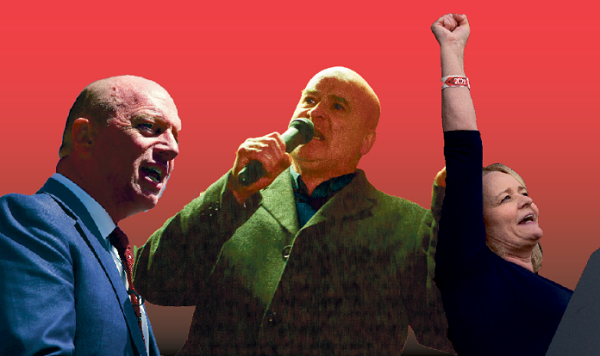
As the Socialist [weekly paper of the Socialist Party – CWI England & Wales] goes to press, British trade union leaders meet with leaders of the Labour Party to discuss its ‘New Deal for Working People’.
The details of what the new ‘New Deal’ will include aren’t public, but Sharon Graham, general secretary of Unite the Union, said: “This new Labour document on the New Deal, issued to the unions on Monday [6 May], is a row back on a row back. It is totally unrecognisable from the original proposals produced with the unions.”
Sharon Graham correctly adds: “All unions must now demand that Labour changes course and puts the original New Deal for Workers back on the table”. RMT leader Mick Lynch said: “Any attempt to water down this popular policy will be met with a robust response from the entire trade union movement.” Other union leaders have been less combative or silent.
The final word on what makes it to Labour’s general election manifesto won’t be had until an election is called and the manifesto released.
Almost universally, trade union leaders have been using the New Deal proposals as a reason for their backing Labour at a general election. In an interview with the Observer, Sharon acknowledges: “When I went to our union’s rules conference last year, the thing I spoke about the most, as to why it was important for us to continue to back Labour, was the New Deal for working people.”
Socialist Party members had campaigned for a rules amendment at that conference to change the union’s rules, opening up the prospect of Unite backing candidates who support the union’s policies, including those outside of Labour.
The RMT transport union for example has backed Jeremy Corbyn to stand in the general election, even in the highly likely scenario that he stands independently of Labour.
Elphicke, or Corbyn and Abbott?
The right-wing, pro-capitalist Labour Party machine has banned Jeremy from standing as a Labour candidate at the general election. A prominent supporter of his leadership, Diane Abbott, remains suspended a year on. Many more seen as being left wing or deemed susceptible to working-class pressure have been disciplined or deselected.
Meanwhile, Natalie Elphicke, a disaffected Tory right-wing member of parliament, is welcomed into the Labour parliamentary group. “On Tuesday 12 March this year, she spoke in support of the new anti-union laws by blaming striking firefighters for the deaths of three people during a past national firefighters’ strike. This is a disgraceful attack on firefighters, who protect the public and save lives every day, sometimes at great personal cost,” Matt Wrack, general secretary of the Fire Brigades Union and President of the Trades Union Congress, said in a letter to the Labour Party leader Keir Starmer.
“Attacking trade union members in this way to justify support for draconian anti-worker laws ought to be incompatible with membership of the Parliamentary Labour Party.”
The Labour Party was formed over 100 years ago out of the process of trade unions identifying the need for their own candidates, independent of capitalist interests. Since, the party has been transformed, and the trade unions no longer have the ability to democratically determine candidates and policy.
Workers’ candidates
The Socialist Party is calling for a workers’ list of candidates to contest the general election, drawn up by the trade union movement. With the backing of even a few trade unions, its existence would cast a shadow over those penning Labour’s manifesto. A counter to the existing big-business pressure.
In the absence of such an initiative led by the trade unions nationally, Socialist Party members are engaged in discussions within the workers’ movement in local areas about a working-class stand independent of Labour – making the case for candidates to come together under the banner of the Trade Unionist and Socialist Coalition.
Even a small bloc of workers’ MPs elected could act as shop stewards in parliament, holding the Labour leadership to account on a daily and weekly basis.
What becomes law under a Labour government, and how quickly, will be determined by the pressure that the workers’ movement and trade unions are able to exert.
100 days to deliver
The Labour leadership has given a timetable for its ‘new deal’ – within 100 days of taking office. Whatever caveats are added about consultations or legislative timeframes, millions of trade unionists have expectations of the changes being carried through. The role of the trade union leaderships should be to organise members to demand Labour meets those expectations in power – that includes popularising support for the unions’ policies now.
For example, by demanding Labour pledges that it will, in the first 100 days of government:
- Raise the minimum wage to the TUC-agreed £15 an hour with no exemptions and for real inflation-proof pay rises for workers
- Renationalise the whole railway industry, Royal Mail, steel, energy and water
- Ban zero-hour contracts, and ‘fire and rehire’
- Repeal the Minimum Service Levels legislation, the Trade Union Act 2016 and all other Tory anti-trade union laws
The Starmer-led Labour government will come into office within two years of a strike wave which took industrial action to levels not seen in a generation. New layers of workers have entered the trade unions and become reps and organisers – even more have seen how workers taking strike action has been able to win concessions from a Tory government, let alone a Labour government promising a ‘New Deal for Working People’.
The National Shop Stewards Network (NSSN) conference in London on 22 June aims to bring together those trade unionists to discuss how to build and strengthen the strikes, and how to fight for a ‘workers’ manifesto’. In essence, how trade unions can fight for workers’ interests before, during and after the general election.
